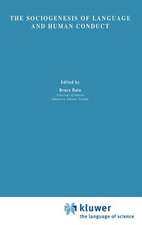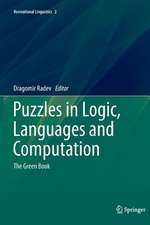Configurationality in Hungarian: Studies in Natural Language and Linguistic Theory, cartea 3
Autor Katalin E. Kissen Limba Engleză Paperback – 30 iun 1987
Din seria Studies in Natural Language and Linguistic Theory
- 24%
 Preț: 808.06 lei
Preț: 808.06 lei - 18%
 Preț: 788.72 lei
Preț: 788.72 lei - 18%
 Preț: 958.56 lei
Preț: 958.56 lei - 15%
 Preț: 600.26 lei
Preț: 600.26 lei - 18%
 Preț: 947.67 lei
Preț: 947.67 lei - 15%
 Preț: 646.62 lei
Preț: 646.62 lei - 18%
 Preț: 723.56 lei
Preț: 723.56 lei - 15%
 Preț: 604.84 lei
Preț: 604.84 lei - 18%
 Preț: 952.09 lei
Preț: 952.09 lei - 15%
 Preț: 642.51 lei
Preț: 642.51 lei - 18%
 Preț: 947.50 lei
Preț: 947.50 lei - 15%
 Preț: 646.75 lei
Preț: 646.75 lei - 18%
 Preț: 1224.54 lei
Preț: 1224.54 lei - 15%
 Preț: 641.71 lei
Preț: 641.71 lei - 18%
 Preț: 2314.56 lei
Preț: 2314.56 lei - 18%
 Preț: 952.89 lei
Preț: 952.89 lei - 18%
 Preț: 1220.12 lei
Preț: 1220.12 lei - 15%
 Preț: 642.83 lei
Preț: 642.83 lei - 18%
 Preț: 944.19 lei
Preț: 944.19 lei - 15%
 Preț: 648.05 lei
Preț: 648.05 lei - 18%
 Preț: 952.57 lei
Preț: 952.57 lei - 18%
 Preț: 1729.61 lei
Preț: 1729.61 lei - 15%
 Preț: 644.95 lei
Preț: 644.95 lei - 15%
 Preț: 644.63 lei
Preț: 644.63 lei -
 Preț: 384.48 lei
Preț: 384.48 lei - 18%
 Preț: 1662.85 lei
Preț: 1662.85 lei - 18%
 Preț: 955.08 lei
Preț: 955.08 lei - 18%
 Preț: 952.40 lei
Preț: 952.40 lei
Preț: 386.81 lei
Nou
Puncte Express: 580
Preț estimativ în valută:
74.02€ • 80.38$ • 62.18£
74.02€ • 80.38$ • 62.18£
Carte tipărită la comandă
Livrare economică 22 aprilie-06 mai
Preluare comenzi: 021 569.72.76
Specificații
ISBN-13: 9789027724564
ISBN-10: 9027724563
Pagini: 272
Ilustrații: VII, 261 p.
Dimensiuni: 155 x 235 x 14 mm
Greutate: 0.39 kg
Ediția:Softcover reprint of the original 1st ed. 1987
Editura: SPRINGER NETHERLANDS
Colecția Springer
Seria Studies in Natural Language and Linguistic Theory
Locul publicării:Dordrecht, Netherlands
ISBN-10: 9027724563
Pagini: 272
Ilustrații: VII, 261 p.
Dimensiuni: 155 x 235 x 14 mm
Greutate: 0.39 kg
Ediția:Softcover reprint of the original 1st ed. 1987
Editura: SPRINGER NETHERLANDS
Colecția Springer
Seria Studies in Natural Language and Linguistic Theory
Locul publicării:Dordrecht, Netherlands
Public țintă
ResearchCuprins
0. Introduction.- 1 Previous Analyses of Hungarian Phrase Structure.- 1.1. The ‘Free Word Order’, or Fully Non-configurational Approach.- 1.2. The ‘NP VP’, or Fully Configurational Approach.- 1.3. The Partially Non-configurational Approach.- 2 Hungarian Phrase Structure.- 2.1. The Invariant Positions of the Hungarian Sentence.- 2.2. Base Rules.- 2.3. Movement into F.- 2.4. Movement into T.- 2.5. Quantifier-Raising.- 2.6. Summary, Implications for Universal Grammar.- 3 Long Wh-movement, or the Traditional Problem of Sentence Intertwining.- 3.1. Long Wh-movement as a Test for Structural Configuration.- 3.2. Sentence Intertwining in Hungarian.- 3.3. Subject-Object Symmetry in Hungarian Long Operator Movement.- 3.4. Conclusion.- 4 Questions of Binding and Coreference.- 4.1. Binding in Hungarian.- 4.2. The Coreference of Pronouns.- 4.3. Weak Crossover.- 4.4. Conclusion.- 5 Infinitival Constructions.- 5.1. Infinitives with an AGR Marker.- 5.2. Subject Control Constructions.- 5.3. The Problem of Governed PRO.- 6 Conclusion.- References.- Index of Names.- General Index.















